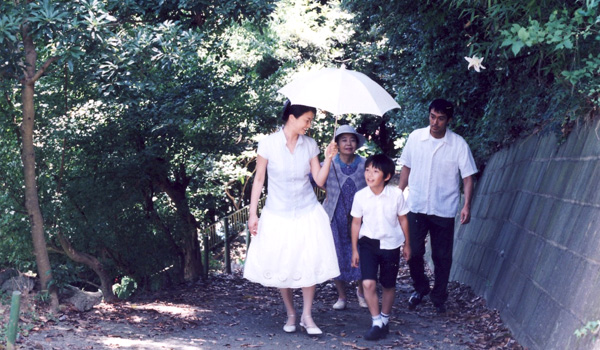
Hirokazu Kore-eda’s STILL WALKING is a special film that honors such Japanese directors as Mikio Naruse, Yasujiro Ozu, and Shohei Imamura
STILL WALKING (ARUITEMO ARUITEMO) (Hirokazu Kore-eda, 2008)
Film Society of Lincoln Center
144 and 165 West 65th St. between Eighth Ave. & Broadway
Wednesday, December 11, Francesca Beale Theater, 8:30
Thursday, December 12, Walter Reade Theater, 1:30
Series runs December 4-12
212-875-5050 / 212-875-5166
www.filmlinc.com
www.aruitemo.com
 Flawlessly written, directed, and edited by Hirokazu Kore-eda (Maborosi, Nobody Knows), Still Walking follows a day in the life of the Yokoyama family, which gathers together once a year to remember Junpei, the eldest son who died tragically. The story is told through the eyes of the middle child, Ryota (Hiroshi Abe), a forty-year-old painting restorer who has recently married Yukari (Yui Natsukawa), a widow with a young son (Shohei Tanaka). Ryota dreads returning home because his father, Kyohei (Yoshio Harada), and mother, Toshiko (Kirin Kiki), are disappointed in the choices he’s made, both personally and professionally, and never let him escape from Junpei’s ever-widening shadow. Also at the reunion is Ryota’s chatty sister, Chinami (You), who, with her husband and children, is planning on moving in with her parents in order to take care of them in their old age (and save money as well). Over the course of twenty-four hours, the history of the dysfunctional family and the deep emotions hidden just below the surface slowly simmer but never boil, resulting in a gentle, bittersweet narrative that is often very funny and always subtly powerful. The film is beautifully shot by Yutaka Yamazaki, who keeps the camera static during long interior takes — it moves only once inside the house — using doorways, short halls, and windows to frame scenes with a slightly claustrophobic feel, evoking how trapped the characters are by the world the parents have created. The scenes in which Kyohei walks with his cane ever so slowly up and down the endless outside steps are simple but unforgettable. Influenced by such Japanese directors as Mikio Naruse, Yasujiro Ozu, and Shohei Imamura, Kore-eda was inspired to make the film shortly after the death of his parents; although it is fiction, roughly half of Toshiko’s dialogue is taken directly from his own mother. Still Walking is a special film, a visual and psychological marvel that should not be missed. It’s screening December 11-12 as part of the Film Society of Lincoln Center festival “Ozu and His Afterlives,” which honors the 110th anniversary of the master filmmaker’s birth and the 50th anniversary of his death; he died on his birthday at the age of sixty in 1963. The series features Ozu’s Equinox Flower and An Autumn Afternoon in addition to seven works that were either directly or indirectly inspired by Ozu and his unique style, including Hou Hsiao-hsien’s Café Lumiere, Jim Jarmusch’s Stranger Than Paradise, Aki Kaurismäki’s The Match Factory Girl, Claire Denis’s 35 Shots of Rum, Pedro Costa’s In Vanda’s Room, and Wim Wenders’s Tokyo-Ga.
Flawlessly written, directed, and edited by Hirokazu Kore-eda (Maborosi, Nobody Knows), Still Walking follows a day in the life of the Yokoyama family, which gathers together once a year to remember Junpei, the eldest son who died tragically. The story is told through the eyes of the middle child, Ryota (Hiroshi Abe), a forty-year-old painting restorer who has recently married Yukari (Yui Natsukawa), a widow with a young son (Shohei Tanaka). Ryota dreads returning home because his father, Kyohei (Yoshio Harada), and mother, Toshiko (Kirin Kiki), are disappointed in the choices he’s made, both personally and professionally, and never let him escape from Junpei’s ever-widening shadow. Also at the reunion is Ryota’s chatty sister, Chinami (You), who, with her husband and children, is planning on moving in with her parents in order to take care of them in their old age (and save money as well). Over the course of twenty-four hours, the history of the dysfunctional family and the deep emotions hidden just below the surface slowly simmer but never boil, resulting in a gentle, bittersweet narrative that is often very funny and always subtly powerful. The film is beautifully shot by Yutaka Yamazaki, who keeps the camera static during long interior takes — it moves only once inside the house — using doorways, short halls, and windows to frame scenes with a slightly claustrophobic feel, evoking how trapped the characters are by the world the parents have created. The scenes in which Kyohei walks with his cane ever so slowly up and down the endless outside steps are simple but unforgettable. Influenced by such Japanese directors as Mikio Naruse, Yasujiro Ozu, and Shohei Imamura, Kore-eda was inspired to make the film shortly after the death of his parents; although it is fiction, roughly half of Toshiko’s dialogue is taken directly from his own mother. Still Walking is a special film, a visual and psychological marvel that should not be missed. It’s screening December 11-12 as part of the Film Society of Lincoln Center festival “Ozu and His Afterlives,” which honors the 110th anniversary of the master filmmaker’s birth and the 50th anniversary of his death; he died on his birthday at the age of sixty in 1963. The series features Ozu’s Equinox Flower and An Autumn Afternoon in addition to seven works that were either directly or indirectly inspired by Ozu and his unique style, including Hou Hsiao-hsien’s Café Lumiere, Jim Jarmusch’s Stranger Than Paradise, Aki Kaurismäki’s The Match Factory Girl, Claire Denis’s 35 Shots of Rum, Pedro Costa’s In Vanda’s Room, and Wim Wenders’s Tokyo-Ga.
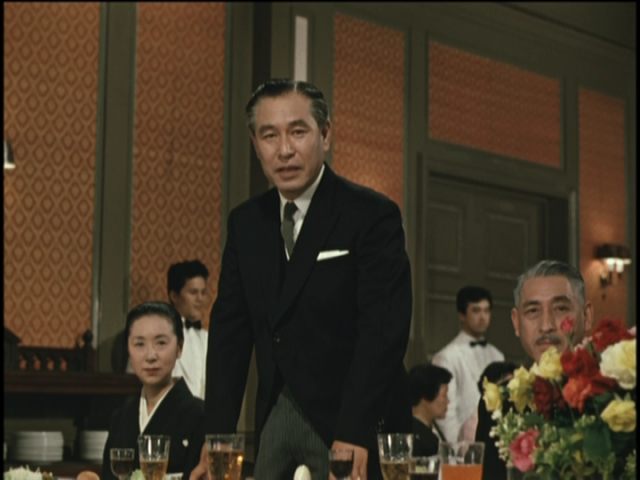
 Yasujirō Ozu’s first film in color, at the studio’s request, is another engagingly told exploration of the changing relationship between parents and children, the traditional and the modern, in postwar Japan. Both funny and elegiac, Equinox Flower opens with businessman Wataru Hirayama (Shin Saburi) giving a surprisingly personal speech at a friend’s daughter’s wedding, explaining that he is envious that the newlyweds are truly in love, as opposed to his marriage, which was arranged for him and his wife, Kiyoko (Kinuyo Tanaka). Hirayama is later approached by an old middle school friend, Mikami (Ozu regular Chishu Ryu), who wants him to speak with his daughter, Fumiko (Yoshiko Kuga), who has left home to be with a man against her father’s will. Meanwhile, Yukiko (Fujiko Yamamoto), a friend of Hirayama’s elder daughter, Setsuko (Ineko Arima), is constantly being set up by her gossipy mother, Hatsu (Chieko Naniwa). Hirayama does not seem to be instantly against what Fumiko and Yukiko want for themselves, but when a young salaryman named Taniguchi (Keiji Sada) asks Hirayama for permission to marry his older daughter, Setsuko (Ineko Arima), Hirayama stands firmly against their wedding, claiming that he will decide Setsuko’s future. “Can’t I find my own happiness?” Setsuko cries out. The widening gap between father and daughter represents the modernization Japan is experiencing, but the past is always close at hand; Ozu and longtime cowriter Kōgo Noda even have Taniguchi being transferred to Hiroshima, the scene of such tragedy and devastation. Yet there is still a lighthearted aspect to Equinox Flower, and Ozu and cinematographer Yuharu Atsuta embrace the use of color, including beautiful outdoor scenes of Hirayama and Kiyoko looking out across a river and mountain, a train station sign warning of dangerous winds, the flashing neon RCA Victor building, and laundry floating against a cloudy blue sky. The interiors are carefully designed as well, with objects of various colors arranged like still-life paintings, particularly a red teapot that shows up in numerous shots. And Kiyoko’s seemingly offhanded adjustment of a broom hanging on the wall is unforgettable. But at the center of it all is Saburi’s marvelously gentle performance as a proud man caught between the past, the present, and the future. Equinox Flower is screening December 8-12 as part of the Film Society of Lincoln Center festival “Ozu and His Afterlives,” which honors the 110th anniversary of the master filmmaker’s birth and the 50th anniversary of his death; he died on his birthday at the age of sixty in 1963. The series also features Ozu’s An Autumn Afternoon in addition to seven works that were either directly or indirectly inspired by Ozu and his unique style, including Hirokazu Kore-eda’s Still Walking, Jim Jarmusch’s Stranger Than Paradise, Aki Kaurismäki’s The Match Factory Girl, Claire Denis’s 35 Shots of Rum, Pedro Costa’s In Vanda’s Room, and Wim Wenders’s Tokyo-Ga.
Yasujirō Ozu’s first film in color, at the studio’s request, is another engagingly told exploration of the changing relationship between parents and children, the traditional and the modern, in postwar Japan. Both funny and elegiac, Equinox Flower opens with businessman Wataru Hirayama (Shin Saburi) giving a surprisingly personal speech at a friend’s daughter’s wedding, explaining that he is envious that the newlyweds are truly in love, as opposed to his marriage, which was arranged for him and his wife, Kiyoko (Kinuyo Tanaka). Hirayama is later approached by an old middle school friend, Mikami (Ozu regular Chishu Ryu), who wants him to speak with his daughter, Fumiko (Yoshiko Kuga), who has left home to be with a man against her father’s will. Meanwhile, Yukiko (Fujiko Yamamoto), a friend of Hirayama’s elder daughter, Setsuko (Ineko Arima), is constantly being set up by her gossipy mother, Hatsu (Chieko Naniwa). Hirayama does not seem to be instantly against what Fumiko and Yukiko want for themselves, but when a young salaryman named Taniguchi (Keiji Sada) asks Hirayama for permission to marry his older daughter, Setsuko (Ineko Arima), Hirayama stands firmly against their wedding, claiming that he will decide Setsuko’s future. “Can’t I find my own happiness?” Setsuko cries out. The widening gap between father and daughter represents the modernization Japan is experiencing, but the past is always close at hand; Ozu and longtime cowriter Kōgo Noda even have Taniguchi being transferred to Hiroshima, the scene of such tragedy and devastation. Yet there is still a lighthearted aspect to Equinox Flower, and Ozu and cinematographer Yuharu Atsuta embrace the use of color, including beautiful outdoor scenes of Hirayama and Kiyoko looking out across a river and mountain, a train station sign warning of dangerous winds, the flashing neon RCA Victor building, and laundry floating against a cloudy blue sky. The interiors are carefully designed as well, with objects of various colors arranged like still-life paintings, particularly a red teapot that shows up in numerous shots. And Kiyoko’s seemingly offhanded adjustment of a broom hanging on the wall is unforgettable. But at the center of it all is Saburi’s marvelously gentle performance as a proud man caught between the past, the present, and the future. Equinox Flower is screening December 8-12 as part of the Film Society of Lincoln Center festival “Ozu and His Afterlives,” which honors the 110th anniversary of the master filmmaker’s birth and the 50th anniversary of his death; he died on his birthday at the age of sixty in 1963. The series also features Ozu’s An Autumn Afternoon in addition to seven works that were either directly or indirectly inspired by Ozu and his unique style, including Hirokazu Kore-eda’s Still Walking, Jim Jarmusch’s Stranger Than Paradise, Aki Kaurismäki’s The Match Factory Girl, Claire Denis’s 35 Shots of Rum, Pedro Costa’s In Vanda’s Room, and Wim Wenders’s Tokyo-Ga.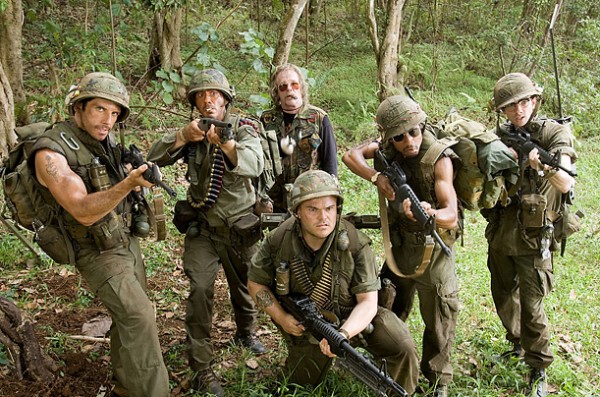
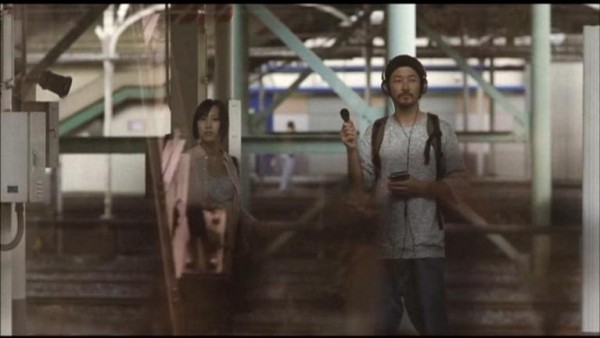
 Taiwanese auteur Hou Hsiao-hsien pays tribute to master filmmaker Yasujirō Ozu’s centenary with Café Lumiere, a beautifully lyrical yet elegantly simple drama about a young woman making her way through life. Pop star Yo Hitoto stars as Yoko, a woman who spends much of her time riding trains and trolleys to visit bookstore owner Hajime (the always excellent Tadanobu Asano) and to find out more about Chinese composer Jiang Wenye. She also returns home to her stepmother (Kimiko Yo) and father (Nenji Kobayashi); the latter doesn’t react when he finds out that Yoko is pregnant and does not intend to marry her boyfriend. In fact, there are barely any emotional reactions at all, although there are plenty of trains taking the characters where they seemingly want to be. Cinematographer Lee Pingping shot Café Lumiere on location with natural sound and lighting; his camera often lingers statically on a scene as the characters walk in and out of the carefully composed frame and are heard off-screen, in long takes, furthering the illusion of reality — mimicking the truth Ozu strove for in his work. In essence, the film has no beginning, no middle, and no end; it is 104 dazzling minutes in the life of a fascinating woman and her friends and relatives. Café Lumiere is screening December 4 at 4:30 and December 6 at 7:30 as part of the Film Society of Lincoln Center festival “Ozu and His Afterlives,” which honors the 110th anniversary of the master filmmaker’s birth and the 50th anniversary of his death; he died on his birthday at the age of sixty in 1963. The series features Ozu’s An Autumn Afternoon and Equinox Flower in addition to seven works that were either directly or indirectly inspired by Ozu and his unique style, including Hirokazu Kore-eda’s Still Walking, Jim Jarmusch’s Stranger Than Paradise, Aki Kaurismäki’s The Match Factory Girl, Claire Denis’s 35 Shots of Rum, Pedro Costa’s In Vanda’s Room, and Wim Wenders’s Tokyo-Ga.
Taiwanese auteur Hou Hsiao-hsien pays tribute to master filmmaker Yasujirō Ozu’s centenary with Café Lumiere, a beautifully lyrical yet elegantly simple drama about a young woman making her way through life. Pop star Yo Hitoto stars as Yoko, a woman who spends much of her time riding trains and trolleys to visit bookstore owner Hajime (the always excellent Tadanobu Asano) and to find out more about Chinese composer Jiang Wenye. She also returns home to her stepmother (Kimiko Yo) and father (Nenji Kobayashi); the latter doesn’t react when he finds out that Yoko is pregnant and does not intend to marry her boyfriend. In fact, there are barely any emotional reactions at all, although there are plenty of trains taking the characters where they seemingly want to be. Cinematographer Lee Pingping shot Café Lumiere on location with natural sound and lighting; his camera often lingers statically on a scene as the characters walk in and out of the carefully composed frame and are heard off-screen, in long takes, furthering the illusion of reality — mimicking the truth Ozu strove for in his work. In essence, the film has no beginning, no middle, and no end; it is 104 dazzling minutes in the life of a fascinating woman and her friends and relatives. Café Lumiere is screening December 4 at 4:30 and December 6 at 7:30 as part of the Film Society of Lincoln Center festival “Ozu and His Afterlives,” which honors the 110th anniversary of the master filmmaker’s birth and the 50th anniversary of his death; he died on his birthday at the age of sixty in 1963. The series features Ozu’s An Autumn Afternoon and Equinox Flower in addition to seven works that were either directly or indirectly inspired by Ozu and his unique style, including Hirokazu Kore-eda’s Still Walking, Jim Jarmusch’s Stranger Than Paradise, Aki Kaurismäki’s The Match Factory Girl, Claire Denis’s 35 Shots of Rum, Pedro Costa’s In Vanda’s Room, and Wim Wenders’s Tokyo-Ga.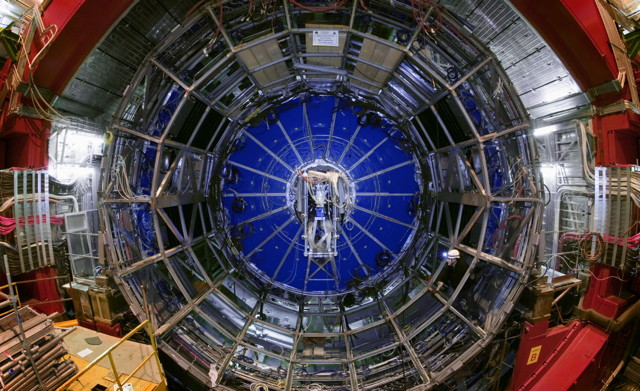
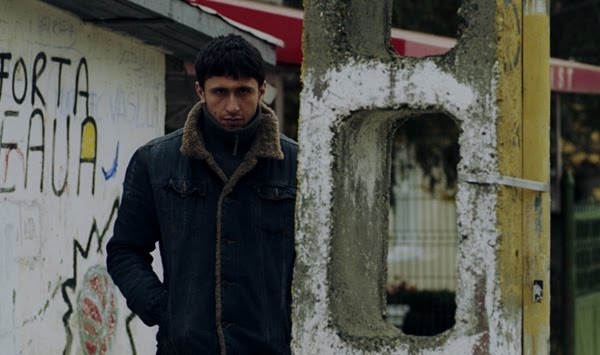
 The first half of Corneliu Porumboiu’s Police, Adjective is as dreadfully boring as Detective Cristi’s (Dragos Bucur) assignment, tailing a student, Victor (Radu Costin), who enjoys a joint with two of his friends every day after school. While Cristi wants to nail the kid’s supplier, the cop’s boss has him on a tight deadline, insisting he arrest Victor if the investigation continues to go nowhere, but Cristi strongly disagrees with putting the teenager away for up to seven years for a crime he believes will soon be abolished by the government. However, the film picks up considerably as Cristi seeks help from various contacts, getting caught up in red tape and public servants who would really rather not be bothered. And when he get called in by the chief (Vlad Ivanov from 4 Months, 3 Weeks, and 2 Days) and gets a long lecture in linguistics, well, you won’t be able to control yourself from laughing out loud. Porumboiu keeps the pace very slow and very steady, but hang in there, because the end is a riot. Police, Adjective, which won the Un Certain Regard Jury Prize at the Cannes Film Festival, screened at the New York Film Festival and at MoMA as part of the “Contenders, 2009,” series, and was Romania’s official entry for the Foreign Language Film Academy Award, is being shown December 2 at 3:00 at the Francesca Beale Theater as part of the Film Society of Lincoln Center series “Making Waves: New Romanian Cinema 2013,” which runs November 29 to December 3 and consists of works dating from 1962 to 2013 by such directors as Calin Peter Netzer, Nae Caranfil, Tom Wilson, Adrian Sitaru, Laura Capatana-Juller, Dan Pita, and Mircea Veroiul. Also on the schedule are the rest of Porumboiu’s films, including 12:08 East of Bucharest, the shorts trio Liviu’s Dream, A Trip to the City, and Gone with the Wine, and his latest, the closing-night selection When Evening Falls on Bucharest or Metabolism, which is being presented December 3 at 6:00 and will be followed by a Q&A with the director.
The first half of Corneliu Porumboiu’s Police, Adjective is as dreadfully boring as Detective Cristi’s (Dragos Bucur) assignment, tailing a student, Victor (Radu Costin), who enjoys a joint with two of his friends every day after school. While Cristi wants to nail the kid’s supplier, the cop’s boss has him on a tight deadline, insisting he arrest Victor if the investigation continues to go nowhere, but Cristi strongly disagrees with putting the teenager away for up to seven years for a crime he believes will soon be abolished by the government. However, the film picks up considerably as Cristi seeks help from various contacts, getting caught up in red tape and public servants who would really rather not be bothered. And when he get called in by the chief (Vlad Ivanov from 4 Months, 3 Weeks, and 2 Days) and gets a long lecture in linguistics, well, you won’t be able to control yourself from laughing out loud. Porumboiu keeps the pace very slow and very steady, but hang in there, because the end is a riot. Police, Adjective, which won the Un Certain Regard Jury Prize at the Cannes Film Festival, screened at the New York Film Festival and at MoMA as part of the “Contenders, 2009,” series, and was Romania’s official entry for the Foreign Language Film Academy Award, is being shown December 2 at 3:00 at the Francesca Beale Theater as part of the Film Society of Lincoln Center series “Making Waves: New Romanian Cinema 2013,” which runs November 29 to December 3 and consists of works dating from 1962 to 2013 by such directors as Calin Peter Netzer, Nae Caranfil, Tom Wilson, Adrian Sitaru, Laura Capatana-Juller, Dan Pita, and Mircea Veroiul. Also on the schedule are the rest of Porumboiu’s films, including 12:08 East of Bucharest, the shorts trio Liviu’s Dream, A Trip to the City, and Gone with the Wine, and his latest, the closing-night selection When Evening Falls on Bucharest or Metabolism, which is being presented December 3 at 6:00 and will be followed by a Q&A with the director.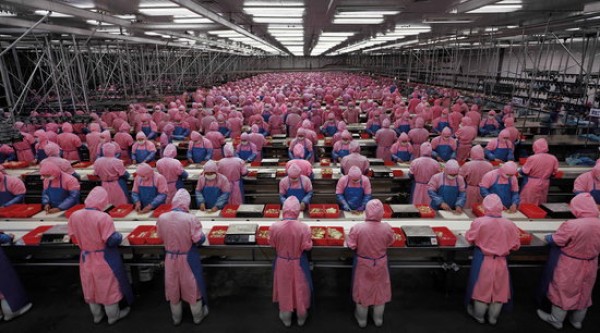
 Photographer Edward Burtynsky has been traveling the world with his large-format viewfinder camera, taking remarkable photographs of environmental landscapes undergoing industrial change. For Manufactured Landscapes, cinematographer Peter Mettler and director Jennifer Baichwal joined Burtynsky on his journey as he documented ships being broken down in Chittagong, Bangladesh; the controversial development of the Three Gorges Dam Project in China, which displaced more than a million people; the uniformity at a factory in Cankun that makes irons and the Deda Chicken Processing Plant in Dehui City; as well as various mines and quarries. Burtynsky’s photos, which were on view at the Brooklyn Museum in late 2005 and often can be seen in New York City galleries (two shows just closed last week), are filled with gorgeous colors and a horrible sadness at the lack of humanity they portray. As in the exhibit, the audience is not hit over the head with facts and figures and environmental rhetoric; instead, the pictures pretty much speak for themselves, although Burtynsky does give some limited narration. Baichwal lets the camera linger on its subject, as in the remarkable opening shot, a long, slow pan across a seemingly endless factory. She is also able to get inside the photographs, making them appear to be three-dimensional as Mettler slowly pulls away. Manufactured Landscapes is screening November 12 as part of the Film Society of Lincoln Center series “Peter Mettler: Pictures of Light,” a midcareer retrospective of the innovative Canadian artist that also features eight shorts and full-length documentaries he directed, including Picture of Light, The End of Time, Plastikman, Petropolis, and Gambling, Gods, and LSD, with Mettler on hand to talk about his work at most shows. In addition, Mettler will participate in the free White Light Festival panel discussion “It’s a Matter of Time” on November 9 at 4:30 with Sylvia Boorstein, Daniel Casasanto, Georg Friedrich Haas, and Alan Lightman and a performance of Steve Reich’s “Clapping Music” by Alan Pierson and Chris Thompson, moderated by John Schaefer.
Photographer Edward Burtynsky has been traveling the world with his large-format viewfinder camera, taking remarkable photographs of environmental landscapes undergoing industrial change. For Manufactured Landscapes, cinematographer Peter Mettler and director Jennifer Baichwal joined Burtynsky on his journey as he documented ships being broken down in Chittagong, Bangladesh; the controversial development of the Three Gorges Dam Project in China, which displaced more than a million people; the uniformity at a factory in Cankun that makes irons and the Deda Chicken Processing Plant in Dehui City; as well as various mines and quarries. Burtynsky’s photos, which were on view at the Brooklyn Museum in late 2005 and often can be seen in New York City galleries (two shows just closed last week), are filled with gorgeous colors and a horrible sadness at the lack of humanity they portray. As in the exhibit, the audience is not hit over the head with facts and figures and environmental rhetoric; instead, the pictures pretty much speak for themselves, although Burtynsky does give some limited narration. Baichwal lets the camera linger on its subject, as in the remarkable opening shot, a long, slow pan across a seemingly endless factory. She is also able to get inside the photographs, making them appear to be three-dimensional as Mettler slowly pulls away. Manufactured Landscapes is screening November 12 as part of the Film Society of Lincoln Center series “Peter Mettler: Pictures of Light,” a midcareer retrospective of the innovative Canadian artist that also features eight shorts and full-length documentaries he directed, including Picture of Light, The End of Time, Plastikman, Petropolis, and Gambling, Gods, and LSD, with Mettler on hand to talk about his work at most shows. In addition, Mettler will participate in the free White Light Festival panel discussion “It’s a Matter of Time” on November 9 at 4:30 with Sylvia Boorstein, Daniel Casasanto, Georg Friedrich Haas, and Alan Lightman and a performance of Steve Reich’s “Clapping Music” by Alan Pierson and Chris Thompson, moderated by John Schaefer.